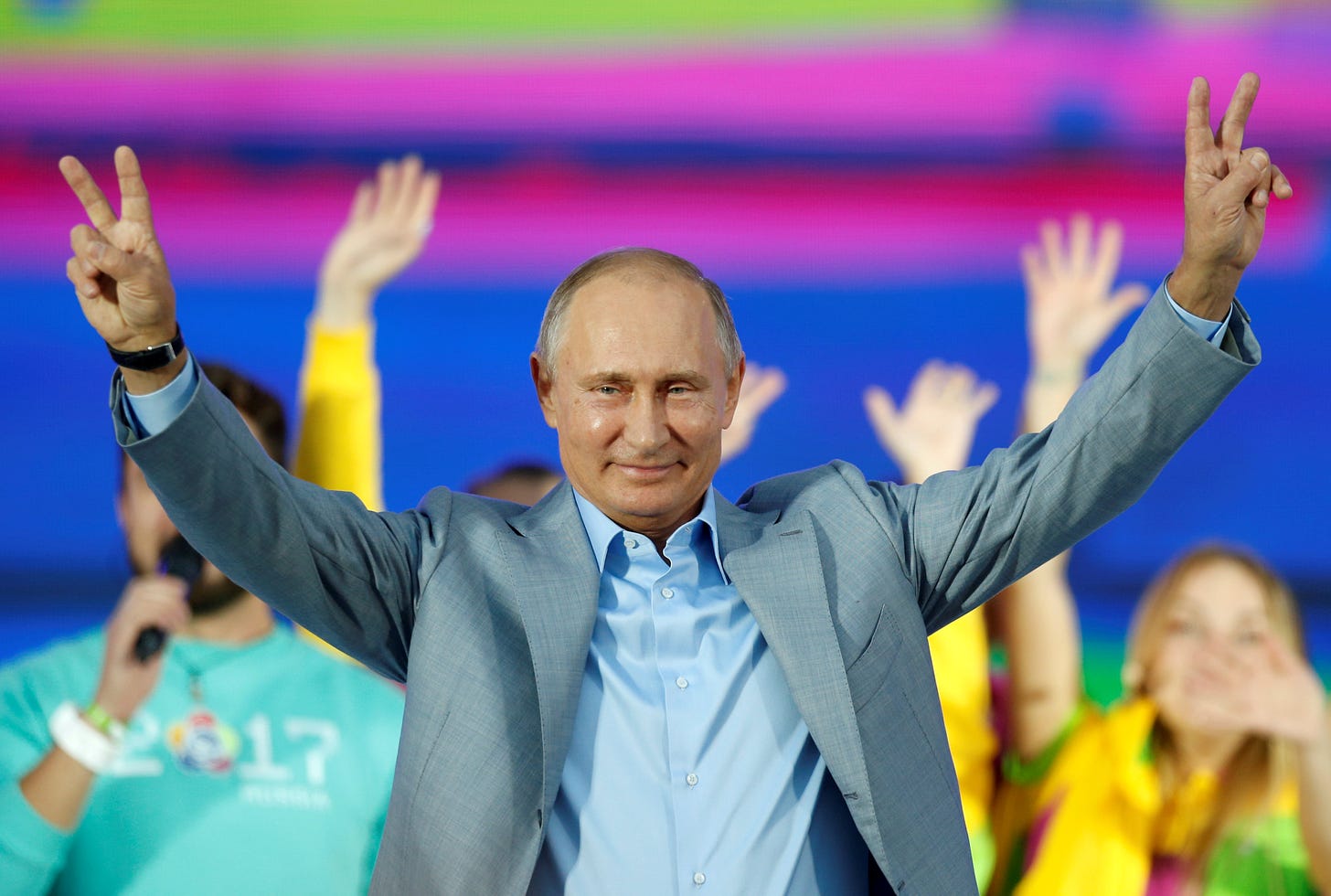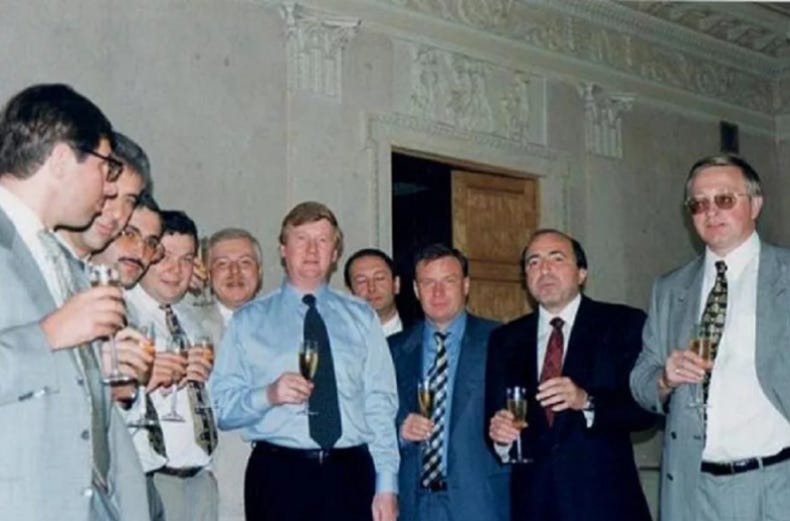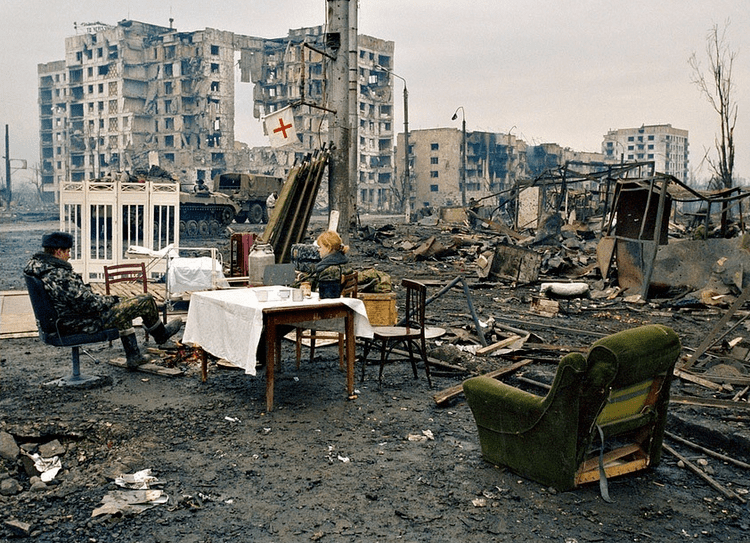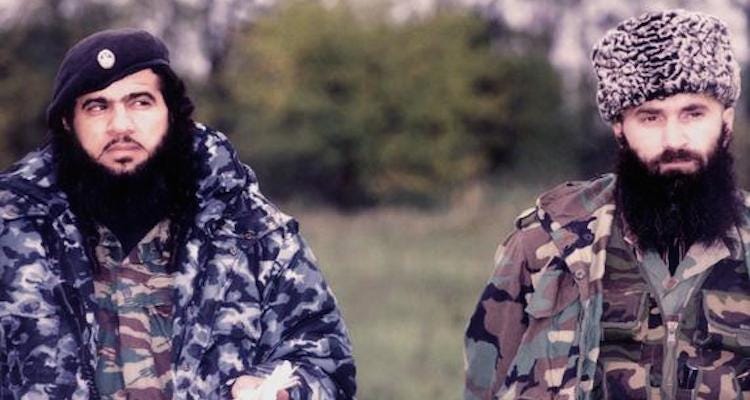My Political Journey Part 5: Vladimir Putin and the Application of State Power 1999-2008
Taming of the Oligarchs, 2nd Chechen War, Economic Reform, Khodorkovsky's Neutralization, Colour Revolutions, South Ossetian War, The West Turns Against Putin
Previous Entry: America’s Rogue Turn and Exile to Internet Forums
The Taming of the Oligarchs
On July 28, 2000 Russia’s new President Vladimir Putin convened a meeting with 21 of the country’s oligarchs and other powerful businessmen. These men represented the richest of the rich, the strongest of the strong, and the dirtiest of the dirty. They had managed to grab a hold of Russia’s key state assets during the incredibly corrupt and violent era of privatization that the country underwent during the catastrophic Yeltsin Presidency. Even more importantly, they managed to survive that era without being assassinated, unlike many of their opponents, some of whose assassinations these men ordered themselves.
Putin called the meeting to offer these men a deal: stay out of politics and you can keep your companies and your ill-gotten wealth. This was a new social contract that would wipe the slate clean, and forgive them of their sins during the previous decade. Putin was indicating that there would be no return to communism, but at the same time business and its leaders would have to now be responsible to the nation as a whole. This heralded the return of the state.
Quite a lot has been written about Russia’s economic and social collapse during the 1990s, so there is no point in repeating it here. For those interested, I showcased an incredibly illuminating book on the subject, Paul Klebnikov’s Godfather of the Kremlin: Boris Berezovsky and the Looting of Russia (original title) as my first entry in the FbF Book Club. Suffice it to say that the privatization conducted under Yegor Gaidar and Anatoly Chubais was the greatest theft of wealth in the history of mankind, and led to a collapse in living standards (and the Ruble, and Russia’s 1998 default) so overwhelming that the average life expectancy of a Russian male dropped to 57.
To me, this collapse was a welcome development. The corrupt communists in charge of the former Soviet Bloc were receiving their comeuppance, while nations that were under their occupation during the Cold War were now free. Russia would not be able to a pose a threat to Europe because it could no longer afford to do so.
As mentioned previously, my anti-Russian attitude was entirely reflexive and parochial; they were communists-turned-Eastern Orthodox Serbophiles (thanks to traditional relations). This reflexive anti-Russian attitude was mitigated by my father explaining to me that Russia was a land of high culture and very high intelligence. He would rave about how the Russians would play hockey (elegantly and smartly), as he criticized the Canadian National Team’s rough-house approach. Only when I was introduced to Chekov, Dostoevsky, Turgenev, and others did I learn this. At the time, western media characterizations of Russia were full of drunken gopniks, and even drunker politicians and military figures.
Two oligarchs were notably absent from the showdown meeting with President Putin: media magnate Vladimir Gusinsky, and his rival Boris Berezovsky, the main subject of Klebnikov’s book that I mentioned above. Both were already under investigation by authorities, and both would take the opportunity to flee Russia. Gusinsky relocated to Malaga, Spain, never to bother Putin again.
Boris Berezovsky also fled, but he proved to be a nuisance to Vladimir Putin, the man he personally groomed and nominated (by way of his influence over Yeltsin’s daughter) to become Premier and then President of Russia. Berezovsky, a mathematician, made the wrong calculation in assuming that he would control Putin from behind the scenes. Instead, Putin turned the tables on him with this meeting and the offer of this new deal. To learn more about Berezovsky’s time in exile, watch this brilliant UK production entitled “The Fugitive”, which followed the revenge-seeking oligarch during his exile in London as he plotted to remove Putin from power in Moscow (which he openly states in the documentary). You will be left with the image of a natural villain, for whom Russian concerns, both national and on an individual level, meant nothing at all.
Gusinsky left quietly, while Berezovsky impotently raged and plotted from London despite some assistance from MI6 and Neil Bush. Neither were desirable agents for regime change in Moscow, as concluded by the CIA. In fact, Putin was at first seen as a potential partner by DC, a stabilizing factor who could assist them in the ‘War on Terror’. The exile of these two oligarchs provided a win for the new President as popular support blamed Russia’s decrepit condition on the oligarchy. Business would now have to answer to the nation by way of its new, and very sober, President. The threat of confiscation of wealth and long imprisonments convinced almost the entire group to accept the deal.
The Second Chechen War
Vladimir Putin was appointed Prime Minister of Russia in August of 1999. He inherited a broken and broke country, with a very ill, alcoholic President, who had difficulty knowing where he was at times. Russia’s territorial integrity itself was under severe threat thanks to the withdrawal of its forces from the Russian Republic of Chechnya, located on its southern border in the Caucasus Mountains.
Much like the economy and society collapsed under Yeltsin, so did the Russian Army. It was soundly defeated during the First Chechen War, where a ragtag group of Chechen nationalist militants managed to force the Russians out of their tiny region. They had achieved de facto independence from a nuclear power. This was national liberation, something that appealed to me, as the Chechens were deported en masse by Stalin during WW2. They were victims of Soviet communism, just like the Poles, the Czechs, the Magyars, the Estonians, and so on. The legacy of the communist era continued to crumble, as national liberation marched ahead. As of 1996, they were free to run their own affairs as they sought fit. What could possibly wrong with this?
(The deadly duo of Ibn al-Khattab and Shamil Basayev)
What went wrong is that Salafi militants, aka Mujahideen, began to infiltrate and then freely arrive in Chechnya, where they found a warm greeting in many quarters (although not universally). Men like Ibn al-Khattab, a Saudi jihadi, agitated to erode the secular character of Chechnya, radicalizing local leaders like Shamil Basayev (Putin would later collect both of their scalps). What began as a fight for national liberation quickly turned into a war for Islamist expansion as Mujahideen invaded neighbouring Russian Dagestan (a region with plenty of Muslims) only five days after Putin became Prime Minister. An Islamic Emirate of the Caucasus was declared, cancelling out, in my opinion, the moral high ground that the Chechens once had. They had gone on the offensive, outside of their own lands, for the sake of imperial expansion in the name of Islam. “These Mujahideen are part of the same network that came to Bosnia (and Kosovo) to kill Christians”, I thought to myself. “This means that Putin has the same enemy as I do”.







